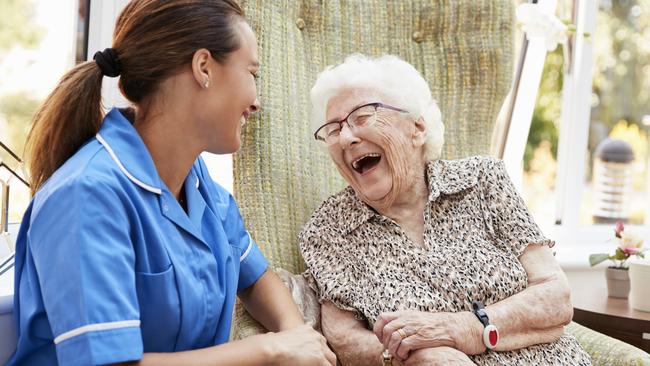Self-funded retirees’ $40,000 extra bill for nursing home user-pays
Some self-funded retirees soon face an average $40k extra coming out of their own pocket.

You can now listen to The Australian's articles. Give us your feedback.
Some self-funded retirees entering a nursing home after July next year face an average $40,000 extra coming out of their own pocket if the Albanese government’s planned new aged-care regimen adopts the recommendations of its taskforce for greater personal co-contributions.
With uncertainty now clouding the future of landmark new aged care laws after hopes for a bipartisan deal in Canberra this week were dashed at the 11th hour, industry analysis shows the average cost of the reforms to a self-funded retiree paying a Residential Accommodation Deposit would be $49 a day, or $18,000 a year.
This would comprise an extra $19 a day for everyday living expenses such as food and laundry, and $30 per day more for their accommodation costs, which will come off the RAD.
With the average length of stay in nursing care sitting at 2.2 years, this equates to just short of $40,000 in total for each resident.
The additional payments would apply to the 55 per cent of all nursing home residents who don’t receive a government pension. About 30 per cent of the nation’s approximately 200,000 aged-care residents pay some form of RAD.
With the financially strapped sector crying out for investment, the additional user-pays component proposed by the taskforce would add $1.35bn a year into a sector when the changes are fully phased in after a grandfathering period, the analysis from leading aged care accountants StewartBrown shows.
And with the median house price in cities close to $1m, or $630,000 in the regions, it argues the additional costs are easily affordable for those retirees.
StewartBrown partner Grant Corderoy, a member of the government’s taskforce chaired by Aged Care Minister Anika Wells, said the extra money being asked of self-funded retirees, most of whom are homeowners, was “simply not that much”.
“What it does is cover the everyday living and accommodation costs of people in aged care, costs they would be paying if they were still living at home,” Mr Corderoy said.
“There has been a scare campaign about these changes leading to people losing their home.
“It’s not the case, with an average RAD-paying resident up for about $18,000 a year extra.”
Mr Corderoy said the financial situation in the nursing home industry was “at crisis juncture”, with aggregate losses in the past five years running to $5bn and little appetite for investment in new stock.
“Whilst currently over 50 per cent of all aged-care homes are operating at a loss, if there is no funding reform then up to 75 per cent of homes are projected to operate at a loss which will inevitably lead to further home closures,” he said.
The taskforce also recommended higher co-contributions for all older Australians receiving in-home care packages. If this is included in the government’s reforms, as expected, it would result in them paying an extra $3850 a year, or $10.55 a day, toward services such as home maintenance and cleaning.
The StewartBrown analysis shows that would bring about $1bn a year into the home-care industry, which has been barely breaking even in recent years.
Full details of the proposed new aged care legislation are yet to be made public and now face further delays, with some opposition members understood to have expressed last-minute reservations.
Health and Aged Care Minister Mark Butler is understood to have been hopeful of announcing bipartisan accord on the landmark reforms on Tuesday, including a new Aged Care Act and the new funding arrangements.
Negotiations have been under way for months, and it is understood there is, or was, “in principle” agreement on the funding reform package.
Labor believes it made significant concessions, including dropping its call for potential criminal penalties on nursing home directors if their facilities fail quality standards, and earlier this week felt there were no further impediments to a deal.
Ms Wells said late on Thursday that negotiations with the opposition had been constructive but had fallen short of a formal agreement to introduce the new legislation. It is expected to be revisited in the next parliamentary sitting starting on September 9.

Ms Wells said that for aged-care reforms to stick “there must be bipartisanship”.
“We can’t have this change from government to government. The sector won’t invest if they’re not confident about the rules,” she said. “Their finances and care options are just too important.”
Opposition aged care spokeswoman Anne Ruston said the Coalition “remain in good-faith negotiations with the government, with the finer details of their package still to be confirmed”.
“The Coalition is not stopping the government from putting the Bill into parliament and we have been publicly encouraging them to do so,” Senator Ruston said.
But aged-care providers say time is running out for those homes in financial distress.
Aged and Community Care Providers Association chief executive officer Tom Symondson, another taskforce member, said “if the new Act isn’t introduced immediately after parliament resumes in a fortnight, the chances of it passing before the next election are near zero”.
“Months of political negotiations, consultations with everyday Australians, consumer groups, economists, unions, providers and experts will have come to naught if the government and the Coalition fail to find a way forward,” he said.
“This is beyond urgent.”






To join the conversation, please log in. Don't have an account? Register
Join the conversation, you are commenting as Logout